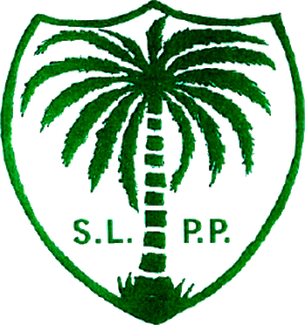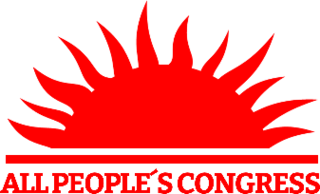 |
|---|
Parliamentary elections were held in Sierra Leone on 1 May 1982. They were the first elections since the country had become a one-party state under the 1978 constitution, with the All People's Congress being the sole legal party.
 |
|---|
Parliamentary elections were held in Sierra Leone on 1 May 1982. They were the first elections since the country had become a one-party state under the 1978 constitution, with the All People's Congress being the sole legal party.
Following an amendment to the constitution in 1981, prior to the election, primaries were held to choose up to three candidates (all selected by the APC) to stand in each of the 85 constituencies. [1] As a result, elections in 66 of the 85 constituencies were contested (13 of the 19 seats left uncontested were held by cabinet ministers). [1]
The elections were marred by violence in which up to 50 people died. [2] The APC used the army to crush opposition SLPP supporters in what became known as the "Ndogboyosoi [bush devil] war". [3]
In addition to the 85 elected seats, the parliament consisted of 12 paramount chiefs elected through tribal councils and 7 MPs appointed by the president, Siaka Stevens.
| Party | Seats | +/– | |
|---|---|---|---|
| All People's Congress | 85 | +15 | |
| Paramount chiefs | 12 | 0 | |
| Presidential appointees | 7 | +4 | |
| Total | 104 | +4 | |
| Source: IPU | |||
The results in 13 constituencies were cancelled due to "serious irregularities". [1] By-elections took place on June 4.
40 sitting MPs and two ministers lost their seats, whilst a woman was elected to parliament in a constituency seat for the first time. [1]

The Sierra Leone People's Party (SLPP) is one of the two major political parties in Sierra Leone, along with its main political rival the All People's Congress (APC). It has been the ruling party in Sierra Leone since 4 April 2018. The SLPP dominated Sierra Leone's politics from its foundation in 1951 to 1967, when it lost the 1967 parliamentary election to the APC, led by Siaka Stevens. Originally a centre-right, conservative party, it identifies since 2012 as a centre-left social democratic party, with a centrist tendency.

The president of the Republic of Sierra Leone is the head of state and the head of government of Sierra Leone, as well as the commander-in-chief of the Armed Forces.

Siaka Probyn Stevens was the leader of Sierra Leone from 1967 to 1985, serving as Prime Minister from 1967 to 1971 and as President from 1971 to 1985. Stevens' leadership was often characterized by patrimonial rule and self-indulgence, consolidating power by means of corruption and exploitation.

The All People's Congress (APC) is one of the two major political parties in Sierra Leone, the other being its main political rival the Sierra Leone People's Party (SLPP). The APC has been the main opposition party in Sierra Leone since 4 April 2018 when Julius Maada Bio of the SLPP won the 2018 presidential elections, though it maintains a majority in parliament.

A Non-constituency Member of Parliament (NCMP) is a member of an opposition political party in Singapore who, according to the Constitution and Parliamentary Elections Act, is declared to have been elected a Member of Parliament (MP) without constituency representation, despite having lost in a general election, by virtue of having been one of the best-performing losers. When less than 12 opposition MPs have been elected, the number of NCMPs is the difference to total 12. NCMPs enjoy all of the privileges of ordinary members of Parliament, apart from the salary, which is substantially lower.

Parliament of Sierra Leone is the legislative branch of the government of Sierra Leone. It is principally responsible for making laws. The Sierra Leone parliament consists of 149 members, of which 135 members are directly elected from across Sierra Leone's 16 districts, while 14 are paramount chiefs appointed from the 14 rural districts. The parliament is led by the Speaker of the House; the position is currently held by Abass Bundu of the Sierra Leone People's Party. The current elected 135 ordinary members of parliament are composed of members of the All People's Congress and the Sierra Leone People's Party which are the two largest political parties in Sierra Leone.
Edward Mohamed Turay was a Sierra Leonean politician and diplomat. He was leader of the opposition All People's Congress (APC) from 1996 to 2002. He was the Sierra Leonean High Commissioner to the United Kingdom from 2010 until his death in 2023.

Ernest Bai Koroma is a Sierra Leonean politician who served as the fourth President of Sierra Leone from 17 September 2007 to 4 April 2018.

General elections were held in Sierra Leone on 11 August 2007. Seven candidates competed in the first round of the presidential election; no candidate received the necessary 55% of the vote to win in the first round, and a second round was held between the top two candidates, Ernest Bai Koroma of the All People's Congress (APC) and Solomon Berewa of the Sierra Leone People's Party (SLPP), on 8 September. According to official results, Koroma won the election with 54.6% of the vote.

General elections were held in Sierra Leone on 26 and 27 February 1996 to elect the President and members of Parliament, with a second round of the presidential election on 15 March. They were the first elections since multi-party democracy had been reintroduced following a referendum on a new constitution in 1991, and the first multi-party elections held in the country since 1977.

Parliamentary elections were held in Sierra Leone on 29 and 30 May 1986. As the country was a one-party state at the time, the All People's Congress was the only party allowed to run. They were the last elections held under the 1978 constitution, as a 1991 referendum returned the country to multi-party politics.

Parliamentary elections were held in Sierra Leone on 6 May 1977. They were the last multi-party elections held in the country until 1996.
Alhaji Minkailu Mansaray is a Sierra Leonean politician, businessman, who was former Sierra Leone minister of mines and mineral resources. He is also the deputy leader of the All People's Congress (APC) party.
Christian Alusine Kamara-Taylor, popularly known as C.A., was a Sierra Leonean politician and one of the founding members of the All People's Congress (APC), along with Siaka Stevens and Sorie Ibrahim Koroma. He served as Minister of Finance of Sierra Leone from 1971 to 1975. He became Minister of Interior in 1975. After the introduction of a one party constitution in 1978, Mr. C.A. Kamara-Taylor became the Second Vice-President of Sierra Leone, and held that post until his death in 1985.

General elections were held in Sierra Leone on 17 November 2012. The result was a sweeping victory for the ruling All People's Congress. Its leader, incumbent president Ernest Bai Koroma, won 58.7% of the vote, enough to win a second term without the need for a runoff. The APC also won 67 of the 112 elected seats in Parliament. To date, it is the APC's best showing at an election since the restoration of multiparty politics in 1991.

The Dominion of Sierra Leone was an independent sovereign state with Queen Elizabeth II as its head of state between independence on 27 April 1961 and becoming the Republic of Sierra Leone on 19 April 1971.
Sheku Badara Bashiru Dumbuya, commonly known as S.B.B. Dumbuya, is a Sierra Leonean politician and former Speaker of the House of Parliament of Sierra Leone. A prominent member of the ruling All People's Congress (APC), S.B.B. Dumbuya was elected as Speaker on January 21, 2014 with one hundred parliamentarians voted in his favor, and fifteen parliamentarians voted for his opponent Bu-Buakei Jabbi of the main opposition Sierra Leone People's Party (SLPP). S.B.B. Dumbuya succeeded Abel Nathaniel Bankole Stronge as speaker.
Chernor Ramadan Maju Bah also commonly known by his nickname Chericoco is Sierra Leonean lawyer and politician who is currently the leader of opposition since 2019 and previous held the position of Deputy speaker of parliament of Sierra Leone in the erstwhile government of Hon. Ernest Bai Korma and Parliamentary Chairman of the Mines and Minerals Resources Committee. He had also served as Chairman of the Parliamentary Legislative Committee.

General elections were held in Sierra Leone on 7 March 2018 to elect the President, Parliament and local councils. Incumbent President Ernest Bai Koroma did not run for another term, as he was constitutionally ineligible, having served the maximum ten years in office.

General elections were held in Sierra Leone on 24 June 2023 to elect the president and members of Parliament. Incumbent president Julius Maada Bio was re-elected with 56% of the vote and the Sierra Leone People's Party won 81 seats in Parliament compared to the main opposition party, the All People's Congress, which won 54 seats. The result was contested by the All People's Congress, which demanded a rerun, citing "glaring irregularities". European election observers stated that there were "statistical inconsistencies" in the presidential results published, with the European Union Election Observation Mission saying that the electoral commission should "publish disaggregated results data per polling station to allow for public scrutiny of the results." Unless that happened, it said that transparency was compromised. The Carter Center echoed these sentiments, as did the United States, Britain, Ireland, Germany, France and the European Union.